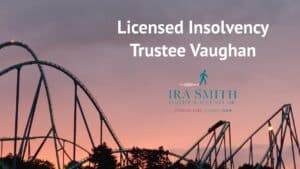
We hope that you and your family are safe, healthy and secure during this COVID-19 pandemic.
Ira Smith Trustee & Receiver Inc. is absolutely operational and Ira, in addition to Brandon Smith, is readily available for a telephone consultation or video meeting.
If you wish to listen to an audio version of this Brandon Blog, please scroll to the very bottom of the page and click play on the podcast.
What is Receivership?
Last week I wrote an easy beginner’s guide on bankruptcy. This Brandon Blog is for anybody interested in finding out what type of insolvency process receivership is and how it differs from some other insolvency processes. I will explain the receivership process, provide an overview of what happens in a receivership, explaining what is sought to achieve, and the consequences of receivership.
Receiverships occur when a secured lender enforces its security to recover loans that have been defaulted on by a borrower. Secured creditors appoint an insolvency trustee to serve as receiver or receiver-manager depending on the terms of their security documents when the corporate debtor defaults.
Receivers and secured lenders can enter into a private contract appointing a receiver. Alternatively, the secured lender may seek an order from the court appointing a receiver. I’ll talk more about that shortly.
What Does Going into Receivership Mean?
If the corporate debtor defaults on a secured loan, the creditor may be entitled to appoint a receiver to collect their money. In Canada, “Section 244” notices are specific forms of notification that secured creditors must send to defaulting companies.
The notice specifies the assets covered by the security, the amount owed by the company in default, and that the secured creditor has the right to enforce the security after 10 days. The debtor company in default can consent to the appointment of the receiver before the expiration of the 10 day notice period.
A Section 244 notice is prescribed under the Bankruptcy and Insolvency Act (Canada) (BIA), and it is usually the last notice a creditor receives before the receiver takes possession of the debtor’s assets, properties, and undertakings.
Receivers then liquidate the assets of a business in order to pay secured creditors.
How Receivership Works
Parliament amended the BIA insolvency legislation in 1992 by enacting Part XI. BIA sections 243 through 252 to deal with secured creditors and receivers. Prior to that time, there was no federal statute insolvency legislation dealing with receivership matters. These provisions provide information about the court that hears bankruptcy and insolvency cases control over receivership matters that involve all or substantially all of the inventory, the accounts receivable, or the other property of a debtor. There are also restrictions imposed on the duties of secured creditors and receivers. It also stipulates that only a licensed insolvency trustee can act as a receiver. Part XI applies to both privately-appointed and court-appointed receivers.
These sections do not confer any powers available to a trustee of a bankrupt estate on secured creditors or receivers. Only those powers conferred upon the receiver in the appointment letter are granted to private receivers, and those are the powers specified in the security instrument. However, the receiver may also exercise certain statutory powers. If certain powers are required to administer the estate but are omitted under the security instrument, a receiver cannot act. Receivers are generally appointed by the secured creditor pursuant to security that at least states:
- the collateral secured under the security; and
- the receiver has the right to dispose of the collateral, including operating the insolvent debtor‘s business.
In a court-appointed receivership, the powers of the receiver come from the receivership appointment court order appointing the court-appointed receiver.
Receivership: Notice and Statement of the Receiver
From the 1992 amendments to the BIA, a receiver is required to provide notice to all known creditors of an insolvent debtor in receivership. Previously, creditors were not required to be notified.
When the receiver has become the receiver of an insolvent debtor‘s property, the receiver must provide notice of receivership as soon as reasonably possible but within 10 days of its appointment. Notice of the receivership must be sent to all creditors, the Office of the Superintendent of Bankruptcy and the insolvent debtor.
If the debtor is also bankrupt, rather than sending the notice to all creditors, the receiver sends the notice to the bankruptcy trustee. Since the creditors are already represented in corporate bankruptcy by the Trustee, the bankruptcy process will deal with them.
A receivership notice states, among other things, that the receiver has been appointed, whether it is a private appointment or a court appointment, and what the receiver’s plan of action is. Additionally, it contains a list of all known creditors.
As part of the receivership process, the receiver must provide interim reports every six months as well as a final report when the receivership is concluded. A copy of the receiver’s final receipts and disbursements statement must also be included in the final notice.
What’s The Difference Between a Court-Appointed Receiver and a Privately Appointed Receiver?
A court-appointed receiver vs. a privately appointed receiver is something people always want to know the answer to. I will explain the difference to you. It is pretty simple. Based on what I have already written, you have probably guessed it by now.
In a Court-appointed receivership, when the Court appoints a receiver, it does so through an Order on the application of the secured creditor. As between a secured creditor and a debtor, a privately appointed receiver is a receiver who is appointed by the secured creditor as provided in the Security Agreement. The Court-appointed receiver’s administration is supervised by the Court.
How is Receivership Different from Bankruptcy? Bankruptcy / receivership
Bankruptcy vs. receivership is also something people want to know. Many times, people confuse the two and use the terms receivership and bankruptcy, mistakenly, interchangeably. Often, receiverships and bankruptcy are confused, but the differences between the two are fairly straightforward. Whether it is a private appointment or a Court-appointed receivership, it is still different.
There are several main differences between bankruptcy and receivership. A receivership is a remedy available to secured creditors, as stated above. In order to enforce the secured creditor’s security rights against a defaulting debtor, a receiver is appointed.
Bankruptcy is a separate legal process. Trustees do not represent secured creditors in bankruptcy. Instead, they represent unsecured creditors. Corporate bankruptcy can occur simultaneously with a receivership of the same corporate debtor. The process of a corporate bankruptcy would be the subject of another Brandon Blog. To find other Brandon Blogs about corporate bankruptcy, use the search function at the top of this page.
What’s the Difference Between Receivership and Liquidation?
By now you know what the definition of receivership is. So I won’t repeat it because I do not want to sound like a broken record (younger people may not catch that reference!)!
Liquidation is not governed by the federal BIA. Rather, it is done under the provincial Business Corporations Act or Wind-Up Act. A liquidation is for a solvent company where the shareholders, Officers and Directors decide to cease business operations by running off any existing contracts and selling off the assets. The cash obtained is then used first to pay off the creditors. Any funds leftover is then distributed to the shareholders.
Just like a receiver, a liquidator can be appointed either privately by resolution of the Directors or by Court order. Liquidation is not a receivership or bankruptcy.
Employee Rights in Bankruptcy Protection and Bankruptcy⁄Receivership
A device was created by the BIA for employees of a company that went bankrupt or into receivership. It does not apply to employees of a company trying to rightsize itself through reorganization; either a BIA Proposal or a Plan of Arrangement under the CCAA. The Wage Earner Protection Program Act (WEPPA) protects wages or benefits, including termination and severance pay, accumulated in the 6 months prior to a business going bankrupt or going into receivership.
The WEPPA ended up being enacted due to the federal government’s concern that when a company went bankrupt and employees were not paid their wages, there was rarely an opportunity for them to recoup any of their income. There are limits or caps on what employees can receive.
In the period in which amounts are past due to you, you will not qualify for WEPPA if:
- you are a Director or Officer of the business;
- or you have worked as a manager for the company
- you are part of the management responsible for negotiating or refusing to pay amounts owed.
You may qualify if:
- the previous employer has gone bankrupt or into receivership.
- The firm owes you wages, salaries, vacation pay, or unreimbursed costs throughout the six months prior to the date of bankruptcy or receivership.
When an employer enters bankruptcy or receivership, the WEPPA provides funds to employees owed money. Those employees who qualify are paid as soon as possible. An employee’s qualifying earnings are equal to seven times their maximum regular insurance earnings under the Employment Insurance Act. According to Service Canada, the maximum amount of $56,300 a year is the limit for insurable earnings as of January 1, 2021. Thus, in 2021 the maximum amount a former employee can claim under WEPPA is $7,578.83.
Trustees and receivers are required to inform employees about the WEPPA program and provide information about amounts due. In the event of bankruptcy or receivership, trustees, as well as receivers, have 45 days to submit to Service Canada the Trustee Information Forms showing the amounts owed to each employee.
In other words, WEPPA‘s payment for former employees is something, but it may not be enough to fully compensate each. As a result of the amount paid by Service Canada, which administers the employment insurance system, $2,000 per employee is a super-priority against the company’s current assets. All remaining amounts paid to each employee, up to the maximum, are unsecured claims.
Receivership summary
I hope you found this receivership Brandon Blog informative and that the differences between receivership, bankruptcy, restructuring and liquidation legal proceedings are now clearer. Because it all has to do with corporate insolvency, the provincial Bankruptcy Courts also deal with receivership matters to adjudicate under the applicable insolvency law.
With too high debt levels and not enough wealth, you are insolvent. You can choose from several insolvency processes to get the debt relief that you need and deserve. It may not be necessary for you to file for bankruptcy.
If you or your business are dealing with substantial debt challenges, you need debt help, and you assume bankruptcy is the only option, call me.
If you’re thinking about bankruptcy, you’re probably in a situation where you’re overwhelmed, frightened, and feel like you’re alone. That’s natural and it is not your fault.
It’s good that you’ve come to this site, where you’ll find answers to your questions, sort through your options, and discover that you can get help. You’re not alone, and the professionals at Ira Smith Trustee & Receiver Inc. are committed to helping you find a debt solution that’s best for you.
It is not your fault that you remain in this way. You have actually been only shown the old ways to try to deal with financial issues. These old ways do not work anymore.
The Ira Smith Team utilizes new modern-day ways to get you out of your debt difficulties with debt relief options as an alternative to bankruptcy. We can get you the relief you need and so deserve. Our professional advice will create for you a personalized debt-free plan for you or your company during our no-cost initial consultation.
You are under a lot of pressure. Our team knows how you feel. You and your financial and emotional problems will be the focus of a new approach designed specifically for you. With our help, you will be able to blow away the dark cloud over your head. We will design a debt settlement strategy for you. We know that we can help you now.
We understand that people with credit cards maxed out and businesses facing financial issues need a realistic lifeline. There is no “one solution fits all” method with the Ira Smith Team. Not everyone has to file bankruptcy in Canada. The majority of our clients never do as we know the alternatives to bankruptcy. We help many people and companies stay clear of filing an assignment in bankruptcy.
Because of this, we can develop a new method for paying down your debt that will be built specifically for you. It will be as unique as the economic problems and discomfort you are experiencing. If any one of these seems familiar to you and you are serious about getting the solution you need to become debt-free, contact the Ira Smith Trustee & Receiver Inc. group today.
Call us now for a no-cost consultation.
We hope that you and your family are safe, healthy and secure during this COVID-19 pandemic.
Ira Smith Trustee & Receiver Inc. is absolutely operational and Ira, in addition to Brandon Smith, is readily available for a telephone consultation or video meeting.


